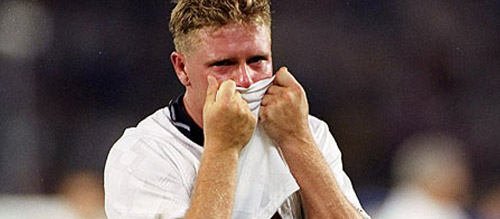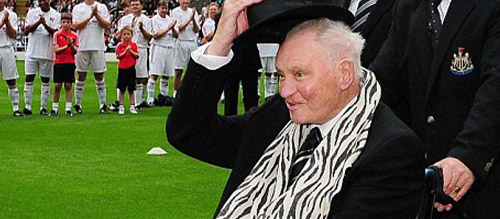7 Moments from ‘Bobby Robson: More Than A Manager’ That Will Give You Chills
6. Gazza’s Tears
“Love’s got the world in motion, and I know that we can do.”
Even for those who weren’t born yet, Italia ’90 was a very special World Cup for English Football Fans. Up until 2018, it was the closest England got to claiming the Jules Rimet trophy since the day the nation hosted (and won) the final in 1966.
Judging by England’s World Cup frenzy in 2018, the 1990 World Cup must have been a very joyful tournament, and this seems to certainly be the case according to the documentary which colours the time as playful and overwhelmingly positive, Robson getting involved with all sorts of antics alongside his team.
England reached the semi-final in this tournament, and the whole affair felt as if it was fraught with destiny as England faced its long-time friendly rival, Germany. The match indeed did go down in history, but not for the reasons anyone expected at the time.
After Gary Lineker scored an equaliser for England, the match proceeded to extra-time, a situation bursting with twists of fate. The most notorious of all of them came when Paul (Gazza) Gascoigne tackled and fouled German player Berthold, and thus received a yellow card.
As the England playmaker had already been booked earlier on in the tournament, it meant that if England qualified for the final, Gazza wouldn’t be allowed to play.
No matter how many times we’ve seen the immortal footage, it doesn’t lose its sting.
As soon as Berthold crashed to the ground, Gazza, Lineker and Bobby Robson immediately realised the sorry outcome; within milliseconds of the referee reaching for his pocket, Gazza’s bottom lip began to wobble before an audience of millions. On the surface, it is incredibly peculiar that the most famous moment of this semi-final match (nay, the entirety of Italia ’90) isn’t actual game-play but a distraught Gascoigne wiping away his tears on his shirt whilst Robson desperately tries to console him, especially as it had such a negative impact on England’s outcome, but it remains so important to so many.
The game went to a penalty shoot-out and Gascoigne (being one of the main penalty takers) was far too shaken to do it. As such, he was replaced. England lost, and Germany went on to win in the final.
Gazza’s reaction has actually been treated with disdain by some, including former Germany international footballer and Liverpool player Dietmar Hamann who was quoted in Simon Burnton’s World Cup Stunning Moments series in The Guardian:
“Had Gascogine been German he would be persona non grata today… In that moment, it was all about him as an individual… It was nothing to do with his duty to the team.”
Even the ref who pulled out the dreaded card, Jose Roberto Wright, was surprised to find out Gazza’s tears was the moment seen as the English falling in love with football again. Burnton, however, understands…
“…if a team succeeds in entertaining and inspiring us, it hardly matters whether they return home with their chins on the floor or with medals around their necks.”
It is an unspoken acknowledgement amongst the English as to why Gazzza cried; he cared about the game and the tournament but also for representing his family and nation. In one single error, he assumed the disappointment of his team and the whole of England upon his shoulders.
Frequently throughout the documentary, Robson declares his own love for “The Beautiful Game”, and you see how this love bled into his teams, but especially the squad he chose for this tournament in 1990. This furious love and care christens Gazza’s open display of emotion as one of the most iconic moments of national pride in England. Despite Robson’s own personal regrets over his decisions in that fateful Italia ’90 semi-final, the England squad undoubtedly came home heroes; and Robson’s huge role (including the shoulder in which Gazza wept into) will never be forgotten.
7. Sir Bobby’s Last Appearance
The overwhelming message of Bobby Robson: More Than A Manager is that the reason why Bobby Robson endures as the most beloved of football managers is because of the special relationship he formed with his players.
Despite his lack of popularity with non Manchester United Fans (a.k.a most of England), audiences will find themselves unable to disagree with the words of Sir Alex Ferguson in which he declares the importance of Robson’s working class roots and how those working-class values never left him.
Proof of this is meticulously documented throughout the film, with there being anecdote after anecdote of Robson’s loyalty, perseverance and compassion.
One of his greatest feats was managing abroad in countries where he didn’t really know the language, but still managed to be aware of every individual player’s problems and would personally help each – it’s no wonder he led all of his overseas teams to major title wins. The devotion, positivity and inspiration he poured into his teams became a two-way street, with Lineker eagerly admitting the fact he would willingly go to the limit for him.
The star-studded cast that fill the documentary, including Sir Alex Ferguson, Alan Shearer, Ronaldo, José Mourinho, Gary Lineker and Pep Guardiola all, in one way or another, admit a debt of gratitude to Robson, with many being directly inspired by him to go into incredibly successful Managing careers themselves.
The most personal and heart-wrenching confession, illuminating Robson’s working relationships is that made by Paul Gascoigne, which saw its bittersweet conclusion at the Italia ’90 England v Germany semi-final “replay” at St James’ Park, Newcastle (which was in aid of The Sir Bobby Robson Foundation). Sir Bobby was very poorly at the time and was being assisted by a wheelchair. In true Bobby Robson fashion, he still went off-schedule to shake hands with all the players.
A Tearful Gazza recounts Robson searching for him in the line-up: he looked up at him and as they made eye-contact and said, quite simply, “Play well.”
Sir Bobby passed away just 5 days later.
From one special one to another, management icon José Mourinho perfectly concludes this remarkable documentary with some poignant words:
“A person only dies when the last person who loves him dies.”
Judging by the testimonies of all of those involved in the film and by those made by fans from England and abroad – that will not be for a very long time.
Recommended for you: 10 Must-See Football Movies




Hello Katie. Thank you for writing this. I enjoyed reading it.
I’m very lucky to look after PR for the Sir Bobby Robson Foundation (and have done since day one). And I can tell you from my own experience of him that Sir Bobby was every bit as special as this wonderful documentary shows him to be.
I think it’s important to note that More Than A Manager was created with the approval and input of Sir Bobby’s family – and, at the filmmakers’ suggestion, that the film helps raise money for the Sir Bobby Robson Foundation by donating a percentage of its profits.
Sir Bobby set up his cancer Foundation as fund within the Newcastle upon Tyne NHS Hospitals Charity in 2008. This means we don’t have professional fundraisers to organise events or co-ordinate volunteers. Despite this, more than £14m has been donated or raised by members of the general public to find more effective ways to detect and treat cancer. Sir Bobby called it his, “last and greatest team.”
The Sir Bobby Robson Foundation works within the NHS and in partnership with other organisations and charities and, while the great man may no longer be with us, his legacy continues to grow.
Support remains as strong as ever – a phrase Sir Bobby was very fond of using seems fitting here, “I’d like to thank them for their faithfulness” – and (I promise!) there is still media interest in our work.
Mark Robson, Sir Bobby’s youngest son, was interviewed on BBC 5 Live last week and we have a wonderful fundraiser who, sadly, has stage IV bowel cancer, being interviewed on the BBC World Service on Saturday morning.
Thanks again for writing this. And you can find out more about the work Sir Bobby’s charity here: http://sirbobbyrobsonfoundation.org.uk/
Oh wow Liz, I’m very happy and proud that you enjoyed my article, but the film itself is so powerful and a joy to watch. I still must confess that I am humbled that you found it and enjoyed my writing.
This article came straight from my heart as I am very much a Newcastle United Fan and work as part of the NHS in the North East, so I know the good work that the Foundation does.
I had no idea that contributions from this documentary went to the Sir Bobby Foundation, so I do hope that my article will help to draw in more audiences (especially as it a genuine “Must See”)
I hope for every success in the Foundation’s future and that they continue to be a part of the fabric of healthcare in the North East.
Thank you again for your comment and for sharing more information on the Foundation for our readers.
Thanks Katie. Yes, a proportion of the money made from the film supports our work – at the filmmakers suggestion. Sir Bobby would have appreciated that. Thanks again, Liz.